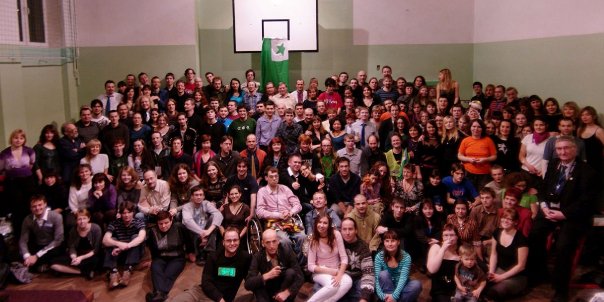Just 2 weeks learning Esperanto can get you months ahead in your target language

Whenever I meet new people and try to help them with their language learning missions, when they hear that I have already learned to speak a few languages and ask me to list them, the one that always gets their attention the most is Esperanto.
Most people have never even heard of it, but occasionally they say that they thought it was dead and that maybe I learned it as an alternative to Klingon or Na'vi just for the hell of it, since “nobody actually speaks it”.
Well, today I am going to make a suggestion that I included as one of many other language hacks in my book and it has nothing to do with saving the world, or peace and love between all races with a universal language. I don't learn Esperanto to aim for a better world some day – to me it has very practical uses right now to me and to many learners.
Even if it had no speakers, it would still be very useful
In fact, let's pretend that nobody actually speaks Esperanto.
In this hypothetical universe, there is just material online to learn it and one guy on Skype in Yemen who is willing to chat to you in it. Even in this situation, I still say that if you aren't speaking your target language yet (Spanish, Japanese, Russian or whatever it may be), then devoting two weeks to Esperanto can get you months ahead in that language.
If you already speak several languages then this particular language hack will be lost on you, but for those of you still behind the “barrier” of actually conversing, this may be just what the doctor ordered!
One big criticism I have for many traditional learning systems is the obsession with studying (a.k.a. input if you like thinking of humans as the same as robots) because they see a language as nothing more than pure information and totally ignore the social aspect of it. You need to get over the barrier of feeling embarrassed, and simply not used to a foreign language. This is the strangest part of learning any language.
“Skip” the hardest first foreign language bit
Why should you learn Esperanto? Because it's easy.
I don't actually like using the word “hard” with languages – I think it's counterproductive to randomly assign negativity, which will do absolutely nothing to actually help you learn a language. But anyway, if you are curious (I do get asked this a lit) the “hardest” language I ever learned and ever will learn was… Spanish. Yep – no matter what language you suggest in the world, Spanish will always have been the hardest one for me.
Not because of the subjunctive, or tables of conjugations or any of the other things that pessimists drool over when they get ready to compile a list of reasons to discourage people. It's because it was the first foreign language that I ever tried to speak. It doesn't matter about the grammar and vocabulary so much when you just are not used to any foreign language coming out of your mouth. This barrier is a tough nut to crack and extra work of needing to worry about conjugations, cases, word genders etc. are generally going to add to this pressure.
The reason I'm suggesting Esperanto for 2 weeks is because it is very easy (no word genders, no conjugation, perfectly phonetic, no random rule exceptions, easy consistent vocabulary). If you are truly devoted and have a lot less to randomly whine about, then in just a couple of weeks you can focus entirely on communication with way less study. You will recognise thousands of words already since most of the vocabulary is based on European languages like French, but there is some English in there too! For example, Yes is pronounced exactly the same (spelled as “jes”).
If you are fully devoted for two weeks, and in the second week do genuinely try to speak it in a chatroom or on Skype, you will be forced to use what you have learned, but you won't have to think too hard to do it. If you are dedicated enough (and use some hacks to make sure you are speaking quicker) you could do this in a very short time. You will get over this speaking barrier and be communicating in a foreign language! You would need more than 2 weeks to speak fluently, but you can indeed speak it and get by in this time.
And then something amazing happens – that target language, the one you really want to speak (for moving to France, trying to rediscover your Chinese roots etc.) suddenly becomes your second foreign language! You already “speak” one, so you have gained this confidence that seemed so unobtainable before, and now you will have that extra edge where you actually want it.
The polyglot edge
It won't surprise you to hear that the more languages you learn, the easier it is to learn the next one. If both me and a monoglot decide to take on language x at the same time, I'll very likely learn it quicker than he will. This isn't because I'm smarter, or because of mysterious reconfigurations within my brain. It's because of techniques, familiarity and confidence. As far as I'm concerned these 3 aspects are the only things that separate me from people still speaking just one language as far as taking on a new language is concerned.
There are plenty of techniques, and familiarity plays a big part too, but the confidence to actually speak will hold you back if you don't have it, even if you know a language inside out. If you can use Esperanto to hack your way towards this confidence quicker, then you will have it for your “second” foreign language; the priority language you definitely want to speak. You will know that you can communicate in a foreign language. You'll have the polyglot edge.
This isn't just my opinion. Several studies have shown that learning Esperanto first will give you that edge. For example, students learned Esperanto for six months and then French for a year and a half. Another control group studied just French for two years – so they had several months more studies in that language. And yet the first group that got “side-tracked” to learn Esperanto had significantly better command of French.
They needed to do it over the long term since this would have been done using the academic approach. As a language hacker, you would only need two weeks (maybe more if you can't be very committed).
This post isn't to convince the world that we all need a universal language. The point is that learning a language that is easy will get you miles ahead. Your actual target language will likely have some tricky things to learn that you will have to master if you are to speak it confidently. But simple confidence in itself won't come to you unless you start speaking a language. It's a vicious circle.
One way I get out of this circle myself is to speak as often as possible as early as possible. But it's easy for me to say this because I have done it already before. Once you do it once, every time after that becomes so much easier.
So why not make the “first” time you do it all about communication with almost no technical grammar etc. to worry about so you can get over this barrier once and for all?
Oh yeah, the language itself is cool
Esperanto fits the bill because it was designed to be easy and material to learn it is very easy to come across. As well as this there are a lot of speakers who will be happy to help you, both online and in lots of places in person.
As I said at the start, even if there was just one guy to talk to and the material available to study, it would still work for the purposes described here. What is actually true is that there are millions of Esperanto speakers all over the world. I've met up with them many times and had lots of fun (click the last link to see me trying out my pathetic skills as an actor in the language).
I'm not looking for an ideal utopian society when I go to these week-long events where everything (karaokes, dinner menus, games, tours…) is in Esperanto. I go to find people I get along with really well, since there are a surprisingly large number of other polyglots, travelers, vegetarians, Linux users, non-drinkers and many open-minded people there.
There are lots of large events all around the world, or you can just find some speakers in your city to practise with, although you can already do a lot online. The Internet has plenty of Esperanto content; the Esperanto Wikipedia has more than 130,000 entries (more than Arabic). You can find an active forum and a fantastic free learning resource (with a great language learning course, a dictionary, a chat room etc.) on Lernu.net (the entire website is available in several languages).
The language sounds pleasant to listen to and has lots of easy to recognise words similar to English, French/Spanish/Italian and German. In fact, the content (not just the confidence) of Esperanto will help you in learning a lot of European languages! When I tried to learn German in school, the Accusative seemed very complicated. Even the name sounds like you are blaming someone. The accusative exists in Esperanto (it's one of the very few bits of grammar, there only so you can have any word order you like), but its use is a lot clearer. Getting used to it there meant that it wasn't so weird to add an -n in German either.
When I tried to learn Czech, the writing system of having “hats” on a letter like s and c didn't seem strange at all, since Esperanto does this to make the language phonetic (s = s but ŝ = sh for example).
Even if you are learning a non-European language, the confidence you would gain in being able to communicate would bring you miles ahead. As I said, this lack of confidence in speaking a language is one of the main reasons people simply don't.
If you can start communicating basically in one language for the investment of just a few weeks, then you wouldn't have to wait the months you would have to otherwise with your target language. I think Esperanto is worth checking out beyond that, but even if all you are interested in is reaching spoken confidence in your actual target language – this small investment could make a big difference.
So what do you think? If you have not been able to speak your target language yet, do you think that this injection of confidence of becoming multilingual in a short time will make a difference? Would you care to continue with Esperanto after that to make sure you were communicating much better? Think Esperanto sounds interesting enough to check out?



Social